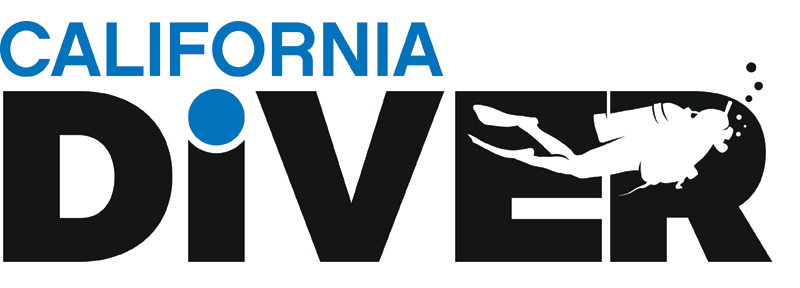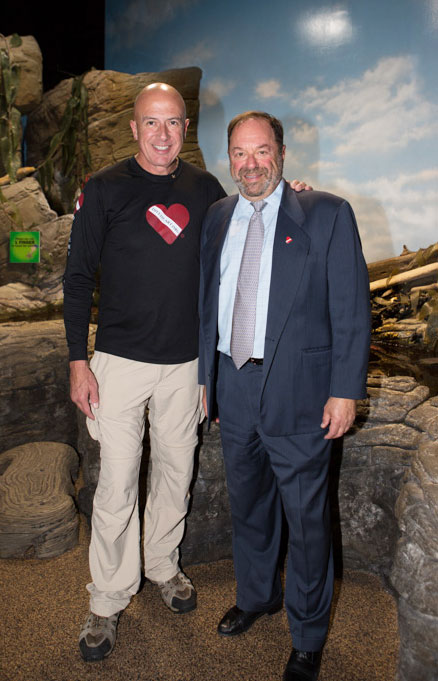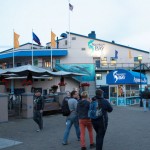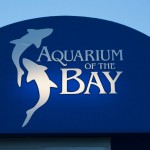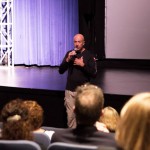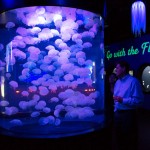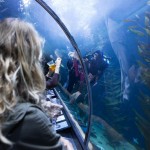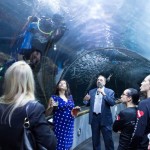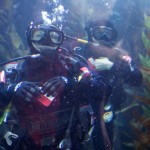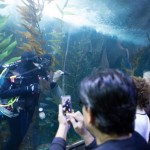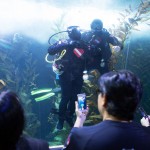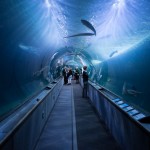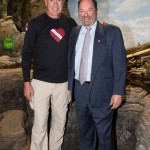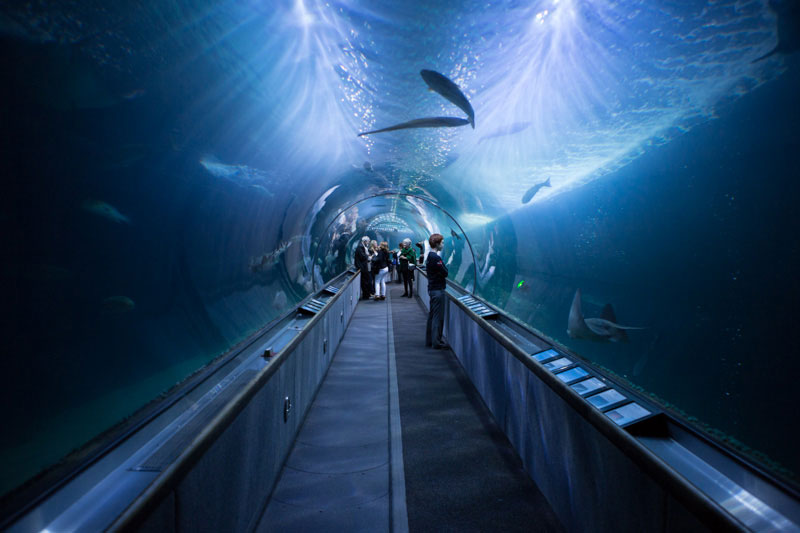
The Aquarium of the Bay features has 300 feet of clear tunnels and features more than 20,000 marine animals.
On Thursday, October 16, Diveheart held a fundraising event at the beautiful Aquarium of the Bay in San Francisco. Founder Jim Elliott, Executive Director Tinamarie Hernandez, and many other volunteers from the Diveheart organization came to San Francisco to raise funding for their training programs, and to introduce their new Diveheart program in the Bay Area.
Diveheart, based in Chicago, was founded in 2001 to train and allow people with a wide range of disabilities to explore the underwater world, using techniques specifically designed to help them explore the underwater environment. Along the way, Diveheart has found that scuba diving has not only deeply inspired and opened up a world of possibilities to disabled people, but also has proven medical benefits, especially to those with chronic pain.
Diveheart Founder Jim Elliott began his diving career in college, as he explains:
“I am a Journalism Major and I thought if I ever have to interview Jacques Cousteau, I better know how to scuba dive, so in College I took diving. I got in the water and went, “This is incredible!”
In addition to diving, Jim had several other life experiences which later helped shape his organization; a background in teaching blind skiers, and a daughter who was born blind.
“I’ve been guiding and teaching blind skiers since the ’80s and I have seen unbelievable things. Confidence, independence, self-esteem in young people and adults with disabilities, and primarily in blind individuals.
All the time I’m thinking right, from my experience (learning to dive) in college, what happens if we get them out of their wheelchairs, get them in the water and teach them how to dive?”
With his passion for helping disabled people, a love of the underwater world, and a big leap of faith, Jim decided to leave his career in the media world and devote himself full-time to teaching the disabled to scuba dive. In 2001 Diveheart was born.
Since then, Diveheart has grown significantly. In 2012, Diveheart held 64 swimming pool events and 6 trips to the Caribbean, Mexico, and the Florida Keys. Notably, their experience isn’t limited to blind people; their program is open to any child, adult, or veteran with a disability, and also to any other diver who wishes to learn to become a buddy to a disabled diver.
“My father and my uncle were veterans with disabilities, so I have dealt with PTSD and I know it from a child’s perspective. I also had a Scoutmaster who had one arm so he taught me how to tie knots with one hand, which was pretty awesome. I guess I’m kind of destined for this, you know what I mean?”
More than inspiration
Beginning with his first experiences teaching skiing to blind men, women, and children, Jim experienced firsthand how much those accomplishments changed the spirits and increased the confidence and independence of the disabled. Now, there’s evidence that scuba diving not only boosts the confidence and well-being of the disabled – it actually has proven medical benefits.
“We knew it would help with self-esteem and confidence, but I had no idea that there was going to be extra help with the serotonin until the doctors from Johns Hopkins found that. They went with one of our teams down to the Cayman Islands and found the serotonin at three atmospheres – sixty-six feet – helps with pain management and anxiety. It’s really unbelievable.
Pretty much like clockwork, on the second day of a dive trip, we’ll have veterans or whoever roll up in a wheelchair and say, “Hey, you know what, you’re not going to believe this. I’ve been in chronic pain for ten years and I’m pain-free for the first time.”
Now we just say, “Get in line,” because this has happened so many times, so that’s very exciting. We are doing stuff with the Illinois School of Psychology and Traumatic Brain Injuries and veterans with PTSD so it’s good stuff.”
Truly, the impact of diving on people with disabilities is huge.
Worldwide ambitions
Diveheart is headquartered in Downers Grove, Illinois – about 30 minutes west of Chicago. Their programs, and future ambitions in particular, span worldwide. They’ve had divers from as far away as Japan and divers with disabilities from all over the country join them in their pool sessions and openwater dives. Jim knows, however, that he can only reach so many people firsthand, and he’s put together a program, which will help train divers anywhere work with disabled divers. It’s an effort that’s taken the best of 6 years to put together. Dive industry veterans Eric Douglas, Ken Berry, and Frazier Nivens have also played a key role in developing the training materials.
Their first two training manuals, Diveheart Adaptive Scuba Instructor and Dive Buddy and Diveheart Adaptive Diver were launched in the Spring of 2014 and are now available on Amazon.com.
Divers who wish to learn firsthand from Diveheart will soon be able to attend one of their new online and on-site training programs, which will formally be announced at the DEMA show next month. The in-water training includes about 20 hours of water work, which will first be held in Florida.
“One of the first places we’ll go is Rainbow Reef in Key Largo. They are very good to us. They are the number one instructor training facility for PADI in North America and we are very lucky that they want to be the Diveheart facility in the country.”
The training in Florida is open for any scuba diver to attend.
“We’re going to be offering it hopefully at least once a month all this next year (2015). We’re going to be in Cozumel in May. Come do the training in Cozumel with us!
We are going to have at least four or five trips next summer, either in the Florida Keys or possibly in Cozumel again, so come train with us when we are doing one of these trips. We open it to everybody and you can become a Buddy, an Instructor, and you can come and then do the programs and be a part of the team.”
Their full training program will also be supported by the new Diveheart website, also due to launch at the DEMA show in November. The site will include both an online training manual and videos.
“What excites me about these materials is that somebody in a remote part of the world that will never come here to do the training, I may never get there but they will be able to go through and get the online manual and watch the videos that don’t exist anywhere else in the world.”
“We have the Head of the Spinal Injury Program at Shriner’s Hospital who we have done dozens of trips with, who basically tells you as an Instructor and Buddy what you need to know when dealing with somebody with this disability and that and spinal cord and CP.”
Combined with the online training, Jim hopes that instructors can serve people within their communities worldwide with disabilities.
Launching in San Francisco
Through a chance encounter in Cozumel, Jim made an important west coast connection.
“We met a couple in Cozumel, Christina and Gordon Bowman-Jones, and they were fascinated when they saw us training off the shore at the Hotel Cozumel with Dive Paradise. They said, “Gosh, we’re in San Francisco. We would really love to help you get something going there.”
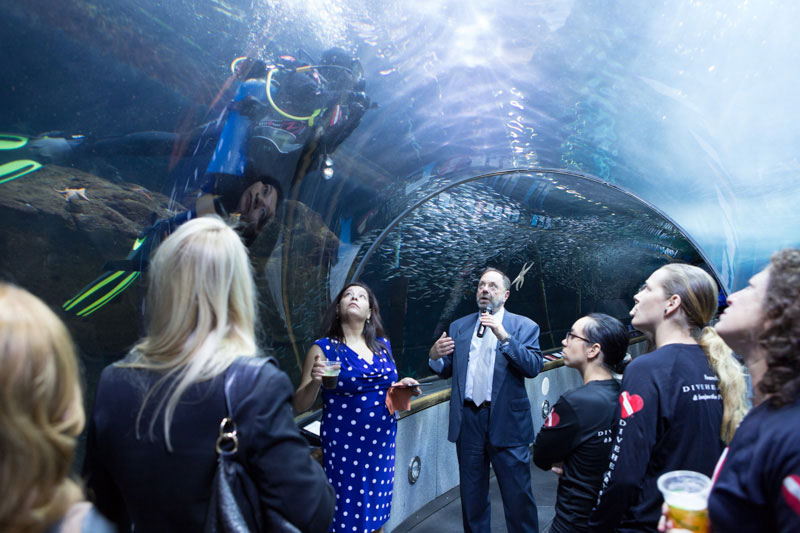
Jim Elliott and volunteer Carol Risdall demonstrate diving as Director Steve Plevin explains the techniques being used. Carol traveled from South Dakota for the event, and was trained as an adaptive dive buddy in Cozumel in May.
On October 16 at the Aquarium of the Bay in San Francisco, Diveheart held the event to both help raise awareness and also raise much-needed funds to expand their programs to the west coast. The event included a silent auction, live auction, presentation in the Aquarium’s theater, and a demonstration dive, where Jim dove in the Aquarium with diver Carol Risdall (with her legs bound, to simulate a disabled diver) and demonstrated some of the techniques Diveheart uses with divers underwater. Spectators viewed the duo as they traveled along and over the aquarium’s 300-foot long tunnel. It was a great demonstration of both the skills Diveheart uses and some insight into the inspiration behind Diveheart.
The event at the Aquarium of the Bay was only the beginning, though.
“We want our programs to be here. We want people who have disabilities in San Francisco and the area to come and work with the group that’s here and find the same relief, the same independence and excitement that we have seen in other parts of the country.
Next year, when we have this event again, I want to be able to say, “Here is our team that has been doing stuff and in the pool and trained,” Because that’s what this is about – getting San Francisco up and running and having people be able to do what we’ve done in Chicago and these other places.”
Jim also stresses that those who want to help out don’t have to be scuba divers.
“Some people say, “I’m not going to be in the water so I don’t know what I can do.” In addition to divers, there are many roles anyone can volunteer for to help spread the word and help launch Diveheart in San Francisco. Anyone with an interest in helping the disabled learn to dive is encouraged to contact Diveheart and be a part of this wonderful organization and their mission to take disabled people scuba diving.
One of Diveheart’s favorite stories concisely sums up the Diveheart experience for a child with a disability. It’s a story you’ll likely hear again from Jim, Steve Plevin (Diveheart’s Volunteer Director), and others in the organization, which conveys the huge impact Diveheart has on people with disabilities:
There’s a kid that’s been wheelchair-bound for his life, known by his friends at school as “Sam the Wheelchair Kid”. Sam the Wheelchair Kid gets to go on one of these trips and becomes an Adaptive Diver. He comes back to school in the fall and the kids say, “What did you do last summer, Sam?”
He said, “Well, I went scuba diving.” All of a sudden he is Sam the Scuba Diver – he’s no longer Sam the Wheelchair Kid.
Please join me in welcoming Diveheart to San Francisco. For more information and to volunteer in the San Francisco area, contact Steve Plevin, Diveheart Volunteer Director, by email at Steven.Plevin@diveheart.org.
Visit Diveheart’s website at http://diveheart.org
- The Aquarium of the Bay at Pier 39 in San Francisco.
- Jim Elliott address the audience in the Aquarium’s theater
- The aquarium’s jellyfish display
- Jim and Carol demonstrate
- Jim Elliott and volunteer Carol Risdall demonstrate assisted diving, with San Francisco volunteer director Steve Plevin explains the techniques to the attendees.
- Diveheart’s Jim Elliott and San Francisco volunteer Director Steve Plevin
